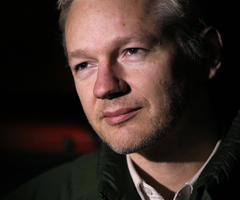MI SELECCIÓN DE NOTICIAS
Noticias personalizadas, de acuerdo a sus temas de interés

The arrest of WikiLeaks founder Julian Assange deals a blow to the “hacktivist” organization he founded-the influence of which had already dwindled significantly in recent years.
Behind the decline, observers say, is partly the erosion of Mr. Assange’s reputation from a prophet of radical transparency to an agenda-driven partisan who published emails from Hillary Clinton’s 2016 presidential campaign that U.S. authorities say were stolen by Moscow.
But the organization’s slide also mirrors a broader darkening of public perceptions of the internet over the past decade. Once seen as a global network that would spread freedom and democracy, the web is now-in part due to WikiLeaks and Russia-often viewed as an enabler of government surveillance and a tool to spread disinformation and polarize public opinion.
“WikiLeaks was part of a widespread utopianism,” said Lisa Lynch, an associate professor of media and communications at Drew University. “Now there is this reassessment of what it means to allow unfettered free exchange of information.”
On Thursday, U.K. police arrested Mr. Assange inside Ecuador’s embassy in London, where he had been granted political asylum before a new government removed ended it. Mr. Assange’s lawyer told journalists that the arrest could mean that “any journalist can be extradited for prosecution in the United States for having published truthful information about the United States.”
WikiLeaks reacted to the arrest by saying on Twitter that “Ecuador and UK are rolling out a PR strategy they have been planning for weeks.”
Founded in 2006, WikiLeaks carved out a new niche by promising to publish caches of factual information leaked from powerful institutions. Initial targets ranged from the Church of Scientology to the far right British National Party, according to the organization’s website. The organization’s global profile peaked in 2010, after publishing more than 250,000 U.S. State Department cables and 500,000 other files related to the wars in Iraq and Afghanistan.
The source of the leak was Chelsea Manning, a former U.S. soldier who was imprisoned between 2010 and 2017 before her 35-year sentence was commuted. But it was Mr. Assange and his shock of white hair that became ubiquitous as he traveled the globe. Earlier that year he delivered a 2010 TED talk entitled “Why the World Needs WikiLeaks.” Asked during the talk to explain his philosophy, Mr. Assange said that he prioritized exposing what is kept secret for the greater good.
“Information that organizations are spending economic effort into concealing, that’s a really good signal that when the information gets out, there’s a hope of it doing some good,” Mr. Assange said. WikiLeaks hasn’t commented on the incident.
Later in 2010, Mr. Assange said he planned to release a trove of information about Bank of America , raising fears that Corporate America was next on his list after governments. But as is the case for any security researcher seeking vulnerabilities across the web, WikiLeaks’ success in obtaining data partly came down to opportunism and luck. The promise of explosive information about the bank never materialized.
Questions also began to loom about how WikiLeaks obtained its information. WikiLeaks had stated it didn’t solicit information and largely received third-party data that it was offered. But in 2012, as a global “hacktivist” collective known as Anonymous began launching ideologically driven cyberattacks against some websites, one of Mr. Assange’s confidants was seen soliciting data on Iceland’s government from Anonymous hackers in a chat room.
WikiLeaks’ involvement in publishing hacked emails during the 2016 election further changed the reputation of the group and Mr. Assange.
“Originally, the goal was to disrupt power. Now he has an obvious agenda,” said Charlie Beckett, a media professor at the London School of Economics who wrote a 2012 book on WikiLeaks. “The trust in Assange’s good faith is completely blown away.”
Despite WikiLeaks’ diminished reputation and Mr. Assange’s isolation, the group has managed to remain a thorn in the side of U.S. authorities. In early 2017, it released documents describing hacking tools and techniques that it said were used by the CIA in cyber operations.
At the same time, the collaborative model of publishing leaked information that Mr. Assange pioneered in the 2010 cable leaks-where he worked with newspapers including the New York Times-has spread without him. A group of investigative journalists from around the world used a similar model in 2016 to publish the Panama Papers, based on leaked documents from a law firm that implicated prominent individuals and companies in tax fraud.
It remains to be seen whether WikiLeaks will survive Mr. Assange’s arrest. WikiLeaks has never been transparent about who works for it, but many staffers who were close to Mr. Assange in 2010 have since left the organization, people who keep track of WikiLeaks said. Observers say Mr. Assange appeared to be closely involved in the organization, even during some of his years in Ecuador’s embassy.
“It was extraordinarily dependent on him,” Mr. Beckett said. “In that sense there’s a kind of disappointment that this kind of leaks model seems to have collapsed under the weight of its own contradictions.”
-Parmy Olson in London and Robert McMillan in San Francisco contributed to this article.
By Sam Schechner
Adam Mosseri fue criticado en un juicio histórico sobre la adicción a las redes sociales por ciertas funciones de la aplicación
El director de Transparencia Colombia, Andrés Hernández, habló de los retos de la región y del desafío de recuperar la confianza ciudadana
El costo de la carne de res ha aumentado más rápido que el de la mayoría de los demás artículos del índice de precios al consumidor